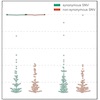 Multiplexed Metagenomic Deep Sequencing To Analyze the Composition of High-Priority Pathogen Reagents
Multiplexed Metagenomic Deep Sequencing To Analyze the Composition of High-Priority Pathogen ReagentsMichael R. Wilson, Greg Fedewa, Mark D. Stenglein, Judith Olejnik, Linda J. Rennick, Sham Nambulli, Friederike Feldmann, W. Paul Duprex, John H. Connor, Elke Mühlberger, Joseph L. DeRisi
ASM mSystems, 2016Abstract: Laboratories studying high-priority pathogens need comprehensive
methods to confirm microbial species and strains while also detecting contamination.
Metagenomic deep sequencing (MDS) inventories nucleic acids present in laboratory
stocks, providing an unbiased assessment of pathogen identity, the extent of
genomic variation, and the presence of contaminants. Double-stranded cDNA MDS
libraries were constructed from RNA extracted from in vitro-passaged stocks of six viruses
(La Crosse virus, Ebola virus, canine distemper virus, measles virus, human respiratory
syncytial virus, and vesicular stomatitis virus). Each library was dual indexed
and pooled for sequencing. A custom bioinformatics pipeline determined the organisms
present in each sample in a blinded fashion. Single nucleotide variant (SNV)
analysis identified viral isolates. We confirmed that (i) each sample contained the expected
microbe, (ii) dual indexing of the samples minimized false assignments of individual
sequences, (iii) multiple viral and bacterial contaminants were present, and
(iv) SNV analysis of the viral genomes allowed precise identification of the viral isolates.
MDS can be multiplexed to allow simultaneous and unbiased interrogation of
mixed microbial cultures and (i) confirm pathogen identity, (ii) characterize the extent
of genomic variation, (iii) confirm the cell line used for virus propagation, and
(iv) assess for contaminating microbes. These assessments ensure the true composition
of these high-priority reagents and generate a comprehensive database of microbial
genomes studied in each facility. MDS can serve as an integral part of a
pathogen-tracking program which in turn will enhance sample security and increase
experimental rigor and precision.
